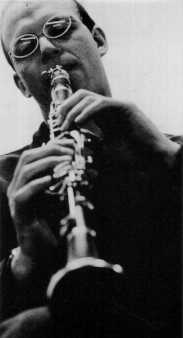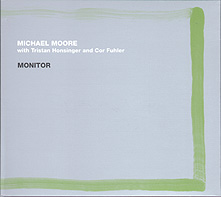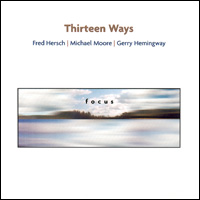

Courtesy of Michael Moore

between the lines

A
FIRESIDE CHAT MICHAEL MOORE
I cannot say enough about an American who shuns the spotlight of hyped
pop culture for the quiet, introspection of the Netherlands. That is right,
the Netherlands. And no, he didn't go for the hash. Michael Moore's (no
not the Roger & Me guy) new recording on Palmetto with Gerry Hemingway
(a guest of the Fireside Chat) and Fred Hersch is blow your hair back
good. But I will let him tell you, unedited and in his own words.
FRED JUNG: Let's start from the beginning.
MICHAEL MOORE: I grew up in Humboldt County, California. My father was
a music teacher in various schools around there. There were instruments
all over the house. I played the piano. Took a few lessons. I came crying
home from my first clarinet lessons, stopped, and started again in Rochester,
New York, when my dad was at Eastman and then switched to alto sax in
high school.
FJ: What were you listening to at the time?
MICHAEL MOORE: Early on I listened to my dad's records - lots of Brubeck,
Oscar Peterson, Miles, Kenton - later on Adderly, Parker, Rollins, Coltrane,
and Stitt. Sly Stone, Steve Miller, Chicago, Blood, Sweat & Tears, The
Loading Zone, Cream, Beatles, Stones, Jefferson Airplane, The Byrds, and
The Association all got to me early on. In high school, I started hearing
Mingus, Dolphy, Braxton and Coleman. I remember my first encounter with
Mauricio Kagel's music as being revelatory - it may have been Exotica
(KOCH Schwann 313912).
FJ: Do you remember your first gig?
MICHAEL MOORE: My first gigs were on the back of a flatbed truck with
the local musicians union concert band. My first night gigs were with
a cover band playing "Light My Fire" and "In-A-Gadda-Da-Vida" on a VOX
Continental organ. More creative music didn't come until I was in high
school when I played a Fender Rhodes piano, sax, and flute, four or five
nights a week in clubs.
FJ: Did you take formal lessons?
MICHAEL MOORE: I learned sax technique from Barry Block and had informal
bop lessons with Don Sheridan. I studied classical piano with Charles
Fukerson at Humboldt State University before going to Boston to study
with Jaki Byard. When I got to the New England Conservatory, I started
studying sax with Carl Atkins, and then with Joe Allard. There I began
playing the clarinet once again so I could work with a fund raising dance
band under the direction of Gunther Schuller.
FJ: Let's talk about your studies with Jaki Byard. What were your impressions
of the late pianist?
MICHAEL MOORE: Jaki had a great deal of respect for people and music and
he did not take himself too seriously. He could play many different ways.
He had a huge palette of colors. When he wanted to move from one realm
to another he just did it - which annoyed people. He was not afraid of
humor. These are things, which I understood better after being in the
Netherlands for a while. He was sometimes bitter, understandably so, considering
the way things were/are. He was a wonderful observer and listener.
FJ: You grew up in the California sun, what prompted you to move to the
Netherlands?
MICHAEL MOORE: I live in Amsterdam because I like the city, I enjoy being
able to go places on a bicycle and I can earn a living playing music that
I enjoy. There is a challenging aesthetic here, as well. I love visiting
and playing in the States but I don't know how I would survive if I came
back there. I don't think that I would be happy living in New York but
I sure like playing with New Yorkers!
FJ: Should your move be attributed to the climate for "free" improvised
music in America?
MICHAEL MOORE: The gigs I do are usually small scale and organized by
a small group of people who really like the music. Their work usually
entails getting money from various governments to support their vision.
I don't know any independently wealthy promoters. In the United States
there seems to be a lot of opposition to the idea of state sponsored art
so it's more difficult for these people to put on events. When corporations
sponsor art events I assume that they write off the expense from their
taxes, which amounts to the same thing, or am I being naive?
FJ: No, quite a few musicians have expressed to me their concerns on the
quality and support of the arts, or lack there of here Stateside, do you
find it is difficult for you to get work outside of New York?
MICHAEL MOORE: Any difficulty I have in getting work in the States is
probably because of lack of exposure. I know that things can happen if
one hires a publicist, but I don't have one.
FJ: Does it concern you that so many American musicians are forced to
go to Europe or Japan to earn a living?
MICHAEL MOORE: I don't think that it's such a problem. If money and goods
can travel freely I think that people should be allowed to as well.
FJ: Do you see the circumstances changing?
MICHAEL MOORE: Immigration laws being scrapped? No. More people getting
interested in improvised music? I'm not holding my breath. When certain
people are offered a homogenous artistic landscape they may grow tired
and want to look further and may find these alternate fantasies of ours.
FJ: Who are some of the musicians who are allowing the artistic landscape
to grow?
MICHAEL MOORE: I'm of the opinion that most everything has been done before
and we're here sifting through all the knowledge in the world, hopefully,
finding a personal vocabulary. I am enjoying the work of Cor Fuhler, Tristan
Honzinger, Ab Baars, Wolter Weirbos, Tobias Delius; pianists Achim Kaufmann,
Benoit Delbecq, Georg Graewe, Curtis Clark and Alex Maguire - but these
are guys I play with! I don't really care whether they're innovators or
not. In America you've got Bill Frisell, John Zorn, Joe Lovano and Dave
Douglas who are enjoying the fruits of media attention as well as Matt
Maneri, Mark Dresser, Hamid Drake and Chris Speed, to name but a few,
who are not.
FJ: How did the Clusone Trio come about?
MICHAEL MOORE: The Trio Clusone began as a quartet with Guus Janssen in
1988 when the Clusone Jazz Festival asked Ernst Reijseger to put together
a group for the festival. It was fun and we did a few more gigs as a quartet
before Guus left saying that he was afraid that it would take up too much
of his time and he wanted to compose. We worked a bit as trio in 1981
but it didn't feel too good - I think that I wasn't flexible enough at
the time - it took me a long time to find a vocabulary that could fit
into various textures.
FJ: Let's touch on your latest endeavor for the Between the Lines label,
Monitor.
MICHAEL MOORE: Monitor came about when Franz Kogelmann, an Austrian flugelhornist
and composer asked me to make an album for a new label. He had a budget
and liked the first idea that I had suggested. Cor Fuhler is a very talented,
young Dutch keyboardist; in the tradition of Misha Mengelberg and Guus
Janssen, he is interested in lots of music and ways to approach them.
Both Cor and Tristan can be very provocative, which is good for me. Tristan
is an American who has been living in Holland and Italy for 25 years.
He has a huge sound and wonderful instincts. He taught Ernst quite a lot
years ago. He makes beautiful music and also great theater pieces.
FJ: Tristan Honsinger plays the cello on the before mentioned MONITOR
release, which is nothing new for you. You have included the cello in
more than one of your projects. What is it about the cello sound?
MICHAEL MOORE: For me the cello can produce some of the most beautiful
sounds in music. It has a wooden sound, blends well and, because of its
range and varieties of articulation, can play different roles in the music.
Ernst has done much work with a chordal, guitar-like approach and the
walking bass function. Tristan is a great melodist.
FJ: You have a new release on the Palmetto label with Gerry Hemingway
and Fred Hersch. Now, correct me if I am mistaken, but I think the trio's
referred to as Thirteen Ways. Catchy name.
MICHAEL MOORE: I believe that the trio with Hemingway and Hersch is indeed
called Thirteen Ways. The title comes from a poem by Wallace Stevens,
which inspired Fred to write a piece, which became the title of the first
trio CD on GM Recordings. I met Fred in 1977 at the New England Conservatory
in Boston. We were both studying with Jaki Byard, among others. Gerry
and I met later but have played with more often in the last ten years.
Fred and Gerry played together first on my album Home Game (Moore with
Herb Robertson and Mark Helias, Ramboy #2). Also on Ramboy are two trios
with Hersch and Helias: CHICOUTIMI and Bering; and a trio with Hemingway
and Marilyn Crispell entitled MGM Trio. I have also done four CDs with
Gerry's quartets and quintets. I hope to be playing with Gerry and Fred
a lot in the future.
FJ: You guys play a Jaki Byard composition on the album, was that a dedication
to the late pianist?
MICHAEL MOORE: Both Fred and I wanted to do some of Jaki's music. He was
such a great guy and a wonderful, open musician. I'm not much one for
tributes. Usually the people don't want or need it -- a tribute to Miles?
Why? But Jaki's music could definitely use more attention. He did some
great things.
FJ: Are you comfortable in the trio format?
MICHAEL MOORE: Trios seem to be very easy for me. There's something about
how you can make a move and influence the music while maintaining the
forward momentum. I've heard that it is often easier for three instruments
to play in tune with each other than two; maybe improvising is like that.
If you have more than, say five people, it gets real difficult to improvise
together. You need to be together for a long time -- like ICP. I've never
been one for large groups and I'm not much of a soloist so…
FJ: What prompted you to start your own label, Ramboy? Does the label
take up much of your time? And what is the most challenging aspect of
running your own label?
MICHAEL MOORE: I started the Ramboy label after receiving a few rejection
notices from various labels that I thought should have been interested
in the music. I was shopping the "home game" quintet recording around
at the time. When Trio Clusone started playing a lot it seemed to be a
good idea to have something to sell at gigs so we quickly got some tapes
together and Han did the cover. I called it Ramboy because my son Reuben
Aaron Moore (RAM) was born about the same time. The label doesn't take
up much time. It is basically recording, editing and graphic design. I
finally have some people to help me with the editing and design and B.V.
Haast does the distribution. I have no budget for promotion so distribution
is basically passive. I haven't learned much business-wise except that
some people are very natural about talking about themselves and their
"work" and I'm not, but I knew that already. I feel that there's are a
lot of people who would really like this music if they were introduced
to it and it's a pity hat it's not readily available (and so expensive
in the States). Maybe you prize more what you have to go after--there's
enough information being thrown at us all the time that I don't feel that
I need to contribute. The hardest thing is making all the decisions myself--but
that's also the beauty of it!
FJ: What do you enjoying doing when you find you have some down time?
MICHAEL MOORE: I don't really divide my time into down and up. I spend
a lot of time with my family and I listen to music a lot. My life doesn't
get too intense. It just flows.
FJ: What do you think of the word jazz?
MICHAEL MOORE: I've thought about the word jazz a lot. Definitions like
Louis', "What I play for a living," and Charlie Haden's, "Creative music
born and bred in America," make me think. I don't mind the term. It's
better than "light music" like they call it in the conservatories here.
I listen to what I think of as jazz a lot and I derive inspiration from
it. I don't have the idea that I am attached to a chronology and all the
greats are my ancestors and I'm furthering "the tradition." I've studied
three traditions in depth--the "jazz" tradition, the European improvisation
tradition and the Brazilian "choro" tradition. I've also tried to learn
something about Balkan, African, Irish, Japanese and other types of American
music traditions. Had I grown up in another milieu then perhaps I'd feel
more like a "jazz" musician. I think that some of the music I make is
"jazz"; there's a groove and/or improvising on chord changes perhaps.
A lot of it is just chamber music. I like the word jazz because it implies
spontaneity and that the written material is not of utmost importance.
FJ: What effect has John Coltrane's music had on you?
MICHAEL MOORE: Coltrane had an incredible ability to concentrate and systematically
work through his ideas. He had a lovely sound, too. I could learn much
more from him. When I was in New York in the late '70s, early '80s, it
felt like there were about five gigs for sax (tenor) players: Art Blakey,
Elvin Jones, Horace Silver and a couple of others, and thousands of horn
players were working on their post-Coltrane stuff. It felt like a huge
waste of creative energy. His was one approach and an overwhelming one.
FJ: Then how about Ornette Coleman's music?
MICHAEL MOORE: Ornette was a greater influence on me. The chordless counterpoint
spoke to me immediately. The colors he used--timbre, intonation, scales
and the relationship between instruments all gave music more possibilities.
You're always aware of where things can go. It was always more ensemble
improvisation compared to the soloist/accompaniment Coltrane idea.
FJ: Do you feel younger musicians, who are versed in these styles, overplay?
MICHAEL MOORE: Many musicians, if not all, overplay. I know I do sometimes.
There is the idea that you first get your technique together, then work
on your concept. People end up playing what they practice and they get
ahead of themselves.
FJ: How have you avoided those trappings?
MICHAEL MOORE: I have tendency to go into my own precious, delicate musical
area. I think for me it's necessary to work with others who will keep
me away from that. I learn from playing with others and I think that one
of the joys of playing music is that there's no end to development--you
can always change partners.
FJ: Are there any future projects you have in mind?
MICHAEL MOORE: I've got great plans for the future. I want to record trio
with Matt Maneri and Mark Dresser, more "Horn Guys" and a project with
the Dave Douglas Quartet. I want to play Dylan songs with Linsey Horner,
David Tronzo and Michael Vatcher and three other Euro/American quartets
next year.
FJ: What releases do you have coming out next year?
MICHAEL MOORE: Ramboy #13--MT. Olympus, a Moore/Alex Maguire duet should
be out in early February. The Achim Kaufmann Quartet on Leo, Benoit Delbecq
Quintet on Songlines, and maybe, eventually, some more Clusone Trio music.
I want to re-release some recordings of Available Jelly and the Persons
from the mid-eighties.
FJ: Any New Year's resolutions?
MICHAEL MOORE: To write more--music and otherwise.
Fred Jung is Editor-In-Chief and suggests you put money into CDs and not
stocks. Comments? Email
him.